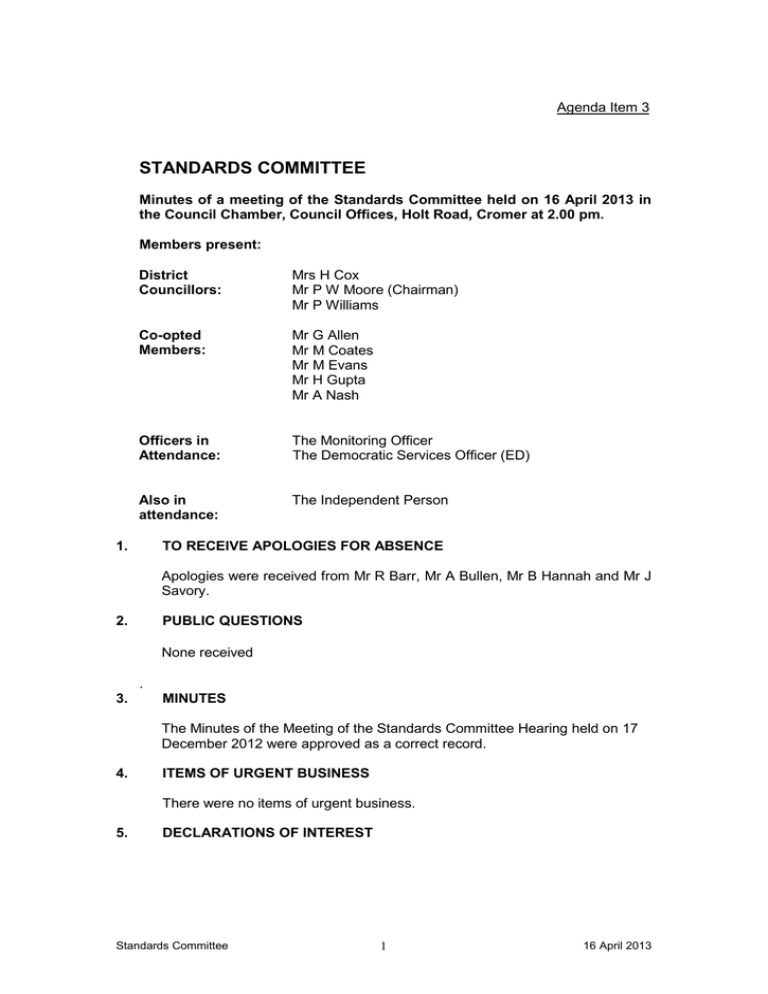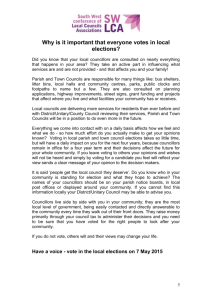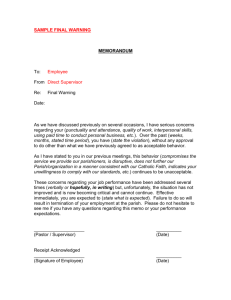STANDARDS COMMITTEE
advertisement

Agenda Item 3 STANDARDS COMMITTEE Minutes of a meeting of the Standards Committee held on 16 April 2013 in the Council Chamber, Council Offices, Holt Road, Cromer at 2.00 pm. Members present: District Councillors: Mrs H Cox Mr P W Moore (Chairman) Mr P Williams Co-opted Members: Mr G Allen Mr M Coates Mr M Evans Mr H Gupta Mr A Nash Officers in Attendance: The Monitoring Officer The Democratic Services Officer (ED) Also in attendance: The Independent Person 1. TO RECEIVE APOLOGIES FOR ABSENCE Apologies were received from Mr R Barr, Mr A Bullen, Mr B Hannah and Mr J Savory. 2. PUBLIC QUESTIONS None received . 3. MINUTES The Minutes of the Meeting of the Standards Committee Hearing held on 17 December 2012 were approved as a correct record. 4. ITEMS OF URGENT BUSINESS There were no items of urgent business. 5. DECLARATIONS OF INTEREST Standards Committee 1 16 April 2013 6. PARISH AND DISTRICT MEMBERS’ REGISTER OF INTERESTS AND OFFICER REGISTER OF GIFTS AND HOSPITALITY The Chairman informed the Committee that the Registers were open to display and were available for inspection in the Legal Services area. 7. PARISH COUNCILS AND STANDARDS The Monitoring Officer introduced this item. He said that the new standards regime had been operating since July 2012. Almost a year on, it seemed to be a good time to use the flexibility of the new regime to engage with the parish councils and find a way to work with them to improve standards of conduct and reduce the number of vexatious complaints. The Chairman, the Monitoring Officer and the Independent Person had met to discuss the content of any training/development programme and they had agreed that a less formal approach would be more effective. It was now up to the Committee to decide how and when to move forward with this. He added that it was difficult to try and predict the impact of any organised training or development and it might be a question of learning from the initial sessions. He concluded by saying that such a programme would be an investment for the Council as they had responsibility for assessing and managing complaints. The Chairman invited members to ask questions: a. b. c. d. Mr P W Moore asked whether members of the public would be allowed to attend the sessions and if they could ask questions. The Monitoring Officer said that it was up to the Parish Council to resolve any issues around procedure but that it would be beneficial if the public could attend. Mr G Allen said that it was important to avoid a ‘top down’ approach. It would be more productive if it could be shown that the Committee wanted to work with the parish councils. He emphasised the importance of promoting standards and educating parish councillors about them. Mr H Gupta commented that the principles of the approach suggested were very good. He said that it allowed for flexibility and easy engagement. It might be useful to have a general discussion with some of the parish councils to try and ascertain what they would like and the format they would prefer. He was happy to get involved in this. Mr P W Moore was concerned that if the Committee attended a parish council meeting and the public were excluded then it could cause problems. He added that there were so many parish councils in the district that it was important that the Committee gave consideration to the best way of doing it. Finally, he wondered whether it would be better to approach the more ‘challenging’ parish councils first and learn from them. The Monitoring Officer responded by saying that the Committee should be invited by the parish councils rather than announce that they were coming. It was feasible to engage with more than one parish council at a time. The Independent Person added that there had been a proposal to run a session of approximately 45 minutes prior to a parish council meeting. This would allow them to raise any concerns and discuss local issues freely. He concluded by saying that in South Norfolk they had invited 8-9 parish councils to attend each session. However, to date, the response had been poor. Standards Committee 2 16 April 2013 e. f. g. h. i. j. Mr M Coates said that he felt the approach shouldn’t be too informal as it was imperative that people understood that standards was an important issue. Mr Gupta acknowledged that it was a big task but the Committee needed to start somewhere and there must be some direction to the approach taken to ensure participation. Mr A Nash said that the Norfolk Association of Parish Councils (NALC) had hosted parish partnerships to improve their working relationships with local authorities. The attendance for these sessions had been variable. He explained that most parish councils were confused as to who to turn to for guidance and that the best time to offer training or development was after an election as there were lots of new councillors in post. Partnership working could be the way forward and he was confident that people would attend. The Committee could link in with NALC’s work to ensure that the message got across. Mr P W Moore agreed. He said that a heavy-handed approach could back-fire and ultimately reduce the number of people wanting to stand for election as a parish councillor. Mr P Williams commented that the most challenging parish councils would be the least likely to co-operate. He agreed that working in conjunction with NALC could be beneficial in promoting the programme. Mr M Evans asked about the process for engaging with parish councils – when it would start and whether there would be a method for evaluating its effectiveness. The Chairman thanked everyone for their input. She said that it was clear that the general consensus was that something needed to be put in place. The Independent Person and the Monitoring Officer both had previous experience of running such programmes and they would now take all the ideas on board and come up with a suitable scheme. It was important that they started as soon as possible so there would be something in place in good time for the next election. She added that the cost implications would need to be taken into account too. Mr G Allen said that it might be preferable to take a simple approach by issuing written guidance initially covering the basic issues and then following that up with an offer to attend a parish council meeting and answer any questions. The Independent Person agreed. He said that some of the more prescriptive parts of the Code of Conduct could be covered by guidance documents and a follow-up workshop could then focus on engaging them on improving standards. Mrs A Shirley said that a different approach might need to be taken for those parish councils that would welcome help and those that wouldn’t be interested. The Chairman agreed that it was important to be flexible. Mr P Williams commented that some of the problems stemmed from weak clerks or dominant chairmen. Mr P W Moore said that one approach would be to ‘target’ the chairman of the parish council and inform them that it was their responsibility to ensure that standards are complied with. Mr M Coates said that the clerk was also an important person and as they were professional they were in a good position to give advice to their councillors. Standards Committee 3 16 April 2013 Mr P Williams proposed that the issue was moved forward as soon as possible and that a small group was formed to select an initial group of parish councils to approach. AGREED That the Monitoring Officer, the Independent Person, the Chairman, Mr P W Moore and Mr P Williams would meet to agree on the approach to take and which parish councils to contact first. 8. EXCLUSION OF PRESS AND PUBLIC The Committee passed the following resolution: ‘That under Section 100A(4) of the Local Government Act 1972 the press and public be excluded from the meeting for the following items of business on the grounds that they involve the likely disclosure of exempt information as defined in paragraphs 1 and 3 of Part I of Schedule 12A (as amended) to the Act’ 9. STANDARDS COMPLAINTS The Monitoring Officer reported on the complaints received, the type of breaches alleged and the status of matters. He advised the Committee that two cases would come to a Hearing – one on 14th May and the other on 4th June. Mrs A Shirley asked whether the Committee could be informed of whether a parish council had acted on the recommendations of the Committee, when a breach was upheld at a Hearing. The Monitoring Officer said that only one Hearing had taken place under the new regime and there had been no public minute of their response. He would contact them and request a formal response and report back to the Committee. The meeting concluded at 15.07 pm ___________ Chairman Standards Committee 4 16 April 2013





